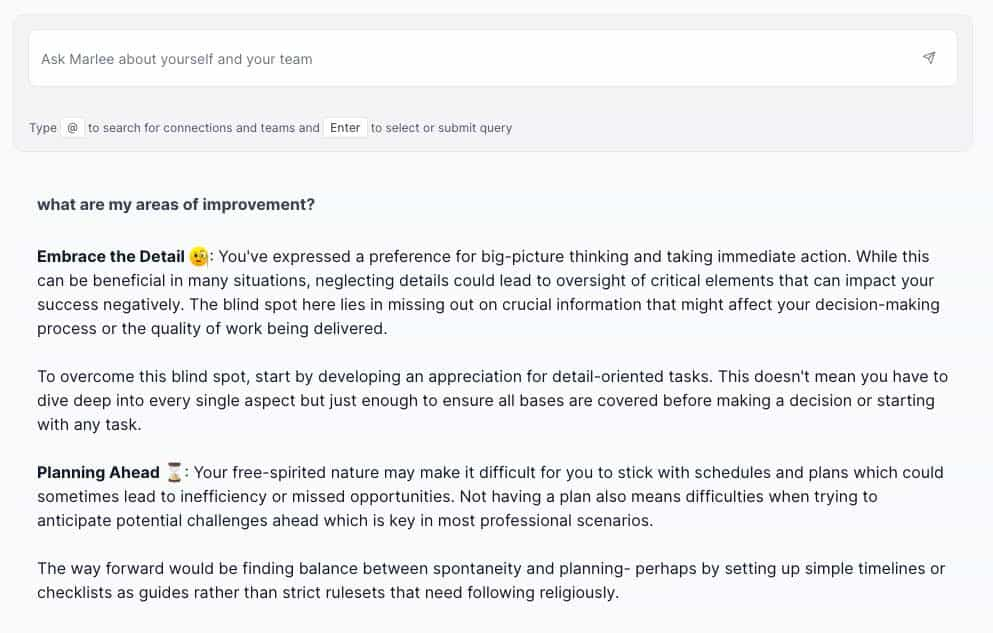20 Areas of improvement examples and how to identify yours
Enhancing your work performance is so important for professional growth and success. Identifying your areas for improvement and actively developing them can lead to increased productivity, better relationships with your colleagues, and more opportunities for your career to take off.
In this blog post, we'll explore 20 critical areas of improvement for employees, providing examples and suggestions to help you excel in your career. We'll also guide you on recognizing your areas of improvement, fostering self-awareness and setting you on the path to professional excellence.
Why focus on your areas of improvement?
Focusing on areas of improvement is important for professional growth and career advancement. By identifying and addressing these areas, you can enhance your skills, increase your value to the organization, and unlock new career opportunities.
Performance reviews play a crucial role in pinpointing your areas for development, while attending training sessions and pursuing ongoing growth opportunities can support self-improvement.
When managers encourage professional and personal development, employees are more likely to be engaged and satisfied. Ultimately, investing in continuous improvement makes individuals more valuable to their employers and sets the stage for long-term success. The good news is that you don't need an extensive training budget - we'll show you how you can unlock your performance with F4S.
What are some areas of improvement examples?
Your manager is likely to provide one-on-one performance reviews to support your growth and evaluate your work contributions - while also sharing opportunities for improvement. With a little bit of preparation, you can use this as an opportunity to highlight your skills and the value you bring to the organization. Let's look at some common areas of improvement so you can confidently walk into your performance review.
1. Integrity
Integrity involves being honest and upholding solid ethics and morals. It's an essential component of building trust. Without integrity, even the most capable and talented employee will have limited success.
To identify if you need to improve:
- What actions show you have a clear understanding of right and wrong?
- Do you always tell the truth?
- Do you avoid conflicts of interest?
- Do you uphold the company's values?
- Do you follow through on commitments?
- Do you give credit where credit is due?

2. Initiative
Initiative refers to a person's ability to take action autonomously. A person with initiative steps forward to get the job done, even when no one asks.
To identify if you need to improve:
- When you spot a problem to solve or a task that needs to be done, do you take action independently?
- Do you ask others to do something before volunteering to do it yourself?
- Do you have confidence in your ability to complete the task, or are you uneasy?
- Do you appreciate constructive feedback?
To improve your initiative:
Try our Start Fast online coaching program to develop your drive and energy to get things started and turn your ideas into action.
3. Ambition
Ambitious employees show drive and a desire to improve themselves and help the company succeed. An employee with ambition aspires to be better than they are now. They seek career growth and often have a personal development plan.
To identify if you need to improve:
- Do you have aspirations to go beyond your current role, or are you coasting by?
- Do you seek out new opportunities and learning experiences?
- Do you ask for regular feedback from colleagues?
- Do you ask for more challenging tasks and projects?
- Do you go above the bare minimum?

4. Time management
Effective time management involves planning tasks, setting priorities, and achieving goals. It requires applying certain principles and tactics. Something as simple as scheduling software for time tracking can ensure achievable goals are met.
To identify if you need to improve:
- Do you set realistic deadlines?
- Can you stick to a schedule?
- Do you plan out your day?
- Do you prioritize your tasks effectively?
- Do you know when to stop working on a project, or do you keep going at the expense of other priorities?
5. Leadership
Contrary to popular belief, leadership isn't just for senior management and executives. Every team member should work on their ability to lead and influence others. Developing leadership skills can lead to career advancement and success in any organization.
To identify if you need to improve:
- Do you set an excellent example for your coworkers?
- Do you show initiative?
- Are you transparent about your processes and decisions?
- Do you invest time in helping and mentoring others?
- Do you have a clear idea of your career journey?
To improve your leadership skills:
Our Personal Power program will help you increase your comfort and confidence to be in positions of influence and leadership.

6. Delegation
Delegation involves assigning tasks to others who are better suited for them. Strong communication skills are essential when delegating work. Tasks should be straightforward, done right, and done quickly. Delegating also helps a team build trust and demonstrates teamwork skills.
To identify if you need to improve:
- Do you ask for help when you're overwhelmed, or do you try to do everything on your own?
- Do you assign tasks appropriately to others who are better suited for them?
- Do you explain tasks thoroughly and in an easy-to-understand manner?
- Do you delegate tasks effectively, or do you tend to micromanage?
- Do you follow up with those you've given tasks to and see how things are going?
To improve your delegation:
Start our Multiply Your Impact program to help you develop a willingness to empower the opinions, feedback, and insights within your team. Multiply your impact through the potential of others.
7. Communication skills
Effective communication is crucial for relaying and receiving information at work.
To identify if you need to improve:
- Do you listen well to others?
- Do you seek first to understand?
- Do you speak openly about your needs?
- Do you address issues and conflicts promptly?
- Do you have effective writing and speaking skills?
- Do you value interpersonal communication?
To improve your communication skills:
Recognizing your unique work style and communication preferences can set you up for success. Effective communication can save you time and energy. Our revolutionary collaboration and performance AI measures 48 motivational traits that influence how you and your colleagues convey and process information.
Answer questions on what motivates you and receive a detailed report instantly. It will reveal your unique strengths and any communication blind spots. You can benchmark your work motivations with top performers and gain insights to develop your communication skills. Set up a team and invite your colleagues, unlocking similarities and differences in communication styles to help you adapt your communications to suit everyone in your work team.
.png)
8. Teamwork skills and collaboration
Your company hires many people, each with a critical skill set and role. However, for the company as a whole to succeed, each employee must work together. Every team member must have excellent communication skills and emotional intelligence to get the best result possible.
To identify if you need to improve:
- Do you cooperate with team members?
- Do you seek out coworkers for their expertise?
- Do you try to build relationships with team members, or do you always keep to yourself?
- Do you go out of your way to include all relevant parties, or do you exclude certain people?
To improve your teamwork and collaboration:
Take your teamwork to the next level with our Team Building coaching program. Accelerate team connection and bonding and unlock energy and motivation in your team.

9. Decision-making skills
Making sound decisions aligned with company values is essential for any role. You want to make good decisions regardless of your decision-making style.
To identify if you need to improve:
- Do you make sound decisions?
- Do you have an established and transparent decision-making process?
- Do you make a decision in a timely manner, or is it a long and drawn-out ordeal?
- Do you trust your decision-making, or do you second-guess yourself?
- Do you make decisions aligned with the company's mission and values?
To improve your decision-making skills:
Take our Trust Your Gut Feel program to explore, strengthen, and stand by what you believe in at work and in life.
10. Goal setting and achievement
Without goals, you will become aimless and stagnant. Setting and achieving goals is essential to professional development.
To identify if you need to improve:
- Do you set realistic and measurable goals for yourself?
- Do you strive to achieve them?
- Do you seek out the resources you'll need to reach your goals?
- Do you set a deadline by which to achieve these goals?
- Are these goals also beneficial to the company?
To improve your goal setting and achievement:
Start our Goal Catcher program to inspire yourself and others to set and achieve grand visions and goals.
11. Empathy
Empathy is a sought-after soft skill for good reason. One benefit is that it can improve company retention rates. Empathy is a critical skill for building relationships and making people feel valued.
To identify if you need to improve:
- Do you try to understand the other person's point of view?
- Do you have the emotional intelligence to recognize your and others' feelings?
- Do you respond with compassion, or do you immediately criticize?
- Do you have active listening skills?
To improve your empathy:
Explore, develop, and strengthen your emotional intelligence (EQ) with our Increase EQ program. Awareness of your and others’ emotions is key to influencing and building authentic connections at work and in life.
12. Creative skills
Creativity involves finding novel ways to carry out projects and solve problems. It helps every company stand out and enhances customer service. Creativity is linked with a higher level of problem-solving.
To identify if you need to improve:
- Do you try to find innovative ways to solve a problem, or do you stick to old ways?
- Do you suggest ideas during meetings?
- Do you have a solid, big-picture vision for your work?
- Are you imaginative during the brainstorming process?
To improve your creative skills:
Try our Big Picture Thinker program to improve your comfort and use of abstract and strategic thinking, to gain a broader perspective on work and life.
13. Job knowledge
You were hired for a specific role. You need to make sure you have the knowledge to do the wide range of tasks listed in your job description.
To identify if you need to improve:
- Are you aware of the expectations and duties relevant to your job?
- Do you display the necessary knowledge and skills to fulfill these duties?
- Are you aware of your own shortcomings?
- Do you attempt to stay up-to-date on new developments, industry trends, and technical skills?
- Do you reach out for help if you lack resources?
14. Productivity
Productivity refers to the amount of work done and how well you utilize your time. Valuable team members are effective contributors, even in difficult times.
To identify if you need to improve:
- Do you fulfill expectations and/or quotas for your role?
- Do you remain focused on your work?
- Do you maximize the productivity tools available to you?
- Do you try to accomplish tasks using the most efficient method?
15. Quality of work
Quality of work assesses the accuracy and excellence of your output. You may be very productive in the sense that you make a lot of something, but what you deliver may be low quality.
To identify if you need to improve:
- Do you hold your work to a high standard of excellence?
- How well do you follow guidelines, procedures, and standards?
- Do you produce minimal errors and defects?
- Do you keep up with your field's latest news and best practices?
- Are your team members and managers satisfied with your work?
To improve the quality of your work:
Start our Attention to Detail program and develop a genuine appreciation, energy, and stamina for detailed thinking.
.png)
16. Dependability
Dependability means being able to be relied upon to do what you say you'll do. It is an essential skill for any employee to have.
To identify if you need to improve:
- Do you follow through on your promises?
- How well do you manage your workload?
- Do you show up to work and meetings on time?
- Do you hold yourself accountable to your commitments?
- Do your coworkers believe they can rely on you?
- How well do you manage your work-life balance?
17. Adaptability skills
While every job comes with a description, every role can expand into new areas. This is especially true for a successful career at a startup, where things change quickly. For that reason, employees must be flexible
To identify if you need to improve:
- Do you remain calm and flexible in the face of unexpected change?
- Are you willing to learn as you go?
- Do you adjust to changing circumstances with relative ease?
- Do you approach a change in plans with an open mind?
- How well do you embrace new challenges and opportunities?
- How well do you learn from your mistakes and failures?
18. Interpersonal skills
Interpersonal skills enable you to communicate and interact effectively with others through verbal and non-verbal cues. These skills are essential for building and maintaining relationships with colleagues and clients. In a team setting, interpersonal skills influence how well you collaborate and work with others. Those with excellent interpersonal skills use appropriate language, actively listen, and demonstrate positive body language, such as maintaining eye contact and showing genuine interest in others.
To identify if you need to improve:
- Do you practice active listening in the workplace?
- Do you show empathy towards colleagues and clients?
- Do you make eye contact during meetings and conversations?
- How well do you adapt the way you talk to different people?
- Do you use body language and facial expressions to clarify your message?
To improve your interpersonal skills:
Develop your interpersonal skills with our Increase Emotional Intelligence program.

19. Organization
Strong organizational skills are essential for maximizing workplace productivity and efficiency. Many techniques can improve organization. Organizational skills include the ALPEN method, making lists, scheduling tasks, and creating Trello boards. Learning to be organized can set employees up for success and help the team work better as a whole.
To identify if you need to improve:
- How well do you manage your time?
- How well do you stay on top of your tasks and responsibilities?
- How well do you plan and prepare for meetings and other events?
- Do you use any tools or systems to stay organized?
- How do you keep track of deadlines and ensure they're met?
- How well do you handle multiple tasks and projects at once?
20. Problem-solving
To solve a problem well, you have to examine the situation, consider your options, and choose the best one. These skills help you handle challenging situations and find creative solutions.
Strong problem-solving skills can be very helpful at work. These traits are important for an organization's growth and success. They're also crucial for conflict resolution and leadership roles.
To identify if you need to improve:
- Do you actively seek out solutions to problems you encounter at work?
- Do you take a systematic approach to problem-solving?
- Do you involve others in the problem-solving process?
- Do you look at problems and think about how to solve them in more than one way?
- Do you follow through on your chosen solutions and track their effectiveness?
How to identify your areas of improvement for your performance review or interview
Now that you've considered your areas for improvement, you'll need to prepare some examples to support them. Think about some moments that demonstrate the areas in which you thrive and the areas in which you can still improve. Knowing your weaknesses is a strength, especially if you're aiming to improve them.
To help you get started, why not Ask Marlee? Once you've answered questions on what motivates you, you can Ask Marlee for your areas of improvement and receive instant answers, backed up with more than 20 years of research.

How to improve your professional skills
So, how do you get started? Once you've completed our motivation assessment you'll learn more about your strengths and blind spots. Whether you want to be a strong leader, improve your conflict management skills, use more creative thinking, improve your time management skills, or reduce your stress levels, our AI coaching can help.
So, how does this relate to your areas of improvement? Let's say you are low in Group Environment, meaning you prefer to work in a private space. If you work in an environment where there are large groups, your productivity might drop. To be more efficient, you might start your work day early or stay late so that you have uninterrupted time to yourself.
The more you understand your workplace motivations, the more room there is for professional improvement.
How can professional development be supported within a company?
When managers push for professional and personal development, workers are more likely to be engaged and happy at work. Performance evaluations can assist in identifying areas for improvement, allowing for professional growth. Improving professional skills makes people more valuable to the company.
Companies can facilitate professional development through performance coaching, internal training programs, and encouraging employees to explore external learning opportunities.
F4S is a research-backed self-development platform that offers personal insights as well as free AI coaching.
Uncover your areas of improvement and your most significant strengths
Answer the questions in our assessment to learn about your motivations and blind spots. Then, use our real-time dashboard to see your results and understand key improvement areas.
My coaching Plan:
Our expert coaches have designed hyper-effective programs that will help
you improve your mental health, wellbeing, productivity, leadership and more.
Coach Marlee (your amazing AI-powered personal coach) will analyse your unique traits and goals to let you know which program to start with (and if there are any you should skip)!
Your recommended programs include:
My Coaching Plan:
Our expert coaches have designed hyper-effective programs that will help you improve your mental health, wellbeing, productivity, leadership and more.
Coach Marlee (your amazing AI-powered personal coach) will analyse your unique traits and goals to let you know which program to start with (and if there are any you should skip)!
Your recommended programs include:

Team Building
Take your teaming to the next level in this high impact 9-week team coaching program with Coach Marlee. Discover and optimize complementary strengths and unique talents with your team, reach decisions together quickly, enjoy team cohesion, high energy and motivation as a bonded team.

Attention to Detail
Impress yourself and others with your attention to detail! Develop a genuine appreciation, energy and stamina for detailed thinking to execute your vision, measure performance in yourself and others while also accelerating your ability to learn and change.

Personal Power
In this high impact eight week program Coach Marlee will help you increase your comfort and confidence to be in positions of influence and leadership, navigate organizational politics and also help you develop greater confidence to compete and influence at the top of your industry or field.

Multiply Your Impact
Multiply your impact by embracing the experience and genius within others. During this eight week program Coach Marlee will help you to develop a genuine appreciation for experimentation and data and a willingness to empower the opinions, feedback and insights within your team and others in your life.

Trust Your Gut Feel
Explore, strengthen and stand by what you believe in at work and in life. Trust in your ‘gut feel’ and point of view is especially helpful for influencing, starting your own business, having your personal needs met and for living an authentic and meaningful life.

Big Picture Thinker
Inspire yourself and others to see the bigger picture! Increase your comfort and use of abstract and strategic thinking to gain a broader perspective in work and life. Big picture thinking is key in communication, leadership, businesses, selling, marketing, and situations where you need to get the gist of things quickly.

Reflection & Patience
Develop ‘step back’ mastery for increased self-awareness and developing mindsets and tools for constant improvement. Reflection and patience is core to consolidating learning, development, strategic thinking, recharging and living an authentic and meaningful life.

Start Fast
Close the gap between your great ideas and starting them. Energy and drive for starting is key for inventing new things, starting businesses, selling, marketing, socializing or in situations where you need to think on your feet.

Increase EQ
Explore, develop or strengthen your emotional intelligence (EQ). Awareness of your and others’ emotions is at the heart of influencing, ‘reading people’, impactful communication, deep relating and authentic connection at work and in life.

Goal Catcher
Inspire yourself and others to see and achieve grand visions and goals. A focus on goals is especially helpful for inspirational leaders, starting your own business, impactful communication, or for achieving awesome outcomes at work and in life.
Testimonials

“I learned to manage my stress about details”

“I have always found it hard to ‘slow’ down but this helped me to see how I can slow down to speed up”

“The Trust Your Gut coaching program with Marlee was simply amazing. It really helped me to reflect on my decision making style in a new light and boosted my confidence. I 200% recommend!”

“Quite amazing how many things get done when they are initiated!”

"Marlee really helped me to understand how to cue in on body language and tone when speaking with others, in order to connect on a deeper level"

“What profound and exciting coaching. Brilliant!”

“I learned how to chunk up and see the bigger picture before turning to the details”

“This coaching program has helped me improve the way I connect, relate and communicate - deepening my relationships with others and also with myself”
Frequently asked questions
Why should I focus on identifying areas of improvement for my career?
Identifying areas of improvement allows you to enhance your skills and overcome weaknesses, which can significantly contribute to your personal and professional growth.
How can I get started on improving my areas of improvement?
Begin by identifying areas where you can improve. Take our free motivation assessment to gain insights into your strengths and weaknesses. Leverage personalized coaching plans to work on specific skills and enhance your career trajectory.
Related Articles
What’s your communication style?
Learn how to connect with colleagues and boost workplace motivation.

Name Surname
Position, Company name

Name Surname
Position, Company name

Name Surname
Position, Company name

Name Surname
Position, Company name

Name Surname
Position, Company name

Name Surname
Position, Company name
Your submission has been received!

Hack your wellbeing, productivity and goals
Programs are created by expert coaches & delivered by our incredible A.I. Coach Marlee. Sessions only take 5-15 minutes and are 100% personalized to fit your unique traits and goals.
